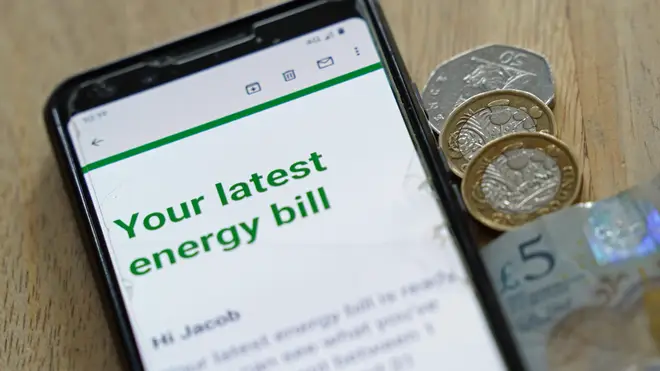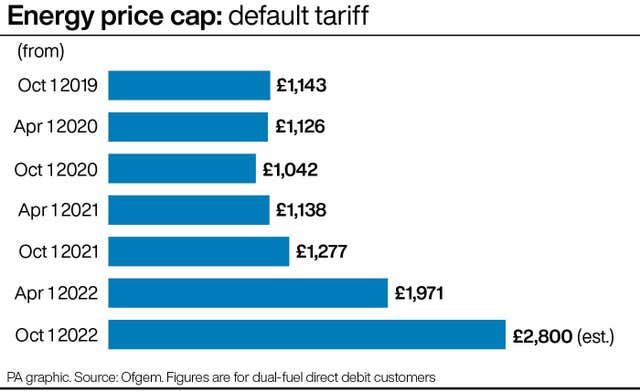
Paul Brand 7am - 10am
24 May 2022, 15:34

Ofgem chief executive Jonathan Brearley told MPs the regulator is expecting an energy price cap in October ‘in the region of £2,800’.
Ofgem chief executive Jonathan Brearley has told MPs the regulator is expecting an energy price cap in October “in the region of £2,800”.
Mr Brearley told the Business, Energy and Industrial Strategy Committee: “I am afraid to say conditions have worsened in the global gas market since Russia’s invasion of Ukraine. Gas prices are higher and highly volatile. At times, they have now reached over 10 times their normal level.
“I know this is a very distressing time for customers but I do need to be clear with this committee, with customers and with the Government about the likely price implications for October.
“Therefore, later today I will be writing to the Chancellor to give him our latest estimates of the price cap uplift.
“This is uncertain; we are only part way through the price cap window, but we are expecting a price cap in October in the region of £2,800.”
Ofgem’s prediction is a huge leap on April’s price cap increase of 54%, or an increase of £693 a year to £1,971 for those on default tariffs paying by direct debit for the average household.
The Resolution Foundation said almost 10 million households could find themselves in “fuel stress” this winter if Ofgem’s prediction came into effect.
The economic think tank’s analysis suggested that the number of families living in fuel stress – defined as spending at least a tenth of their total budgets on energy bills alone – would rise from five million to 9.6 million.
Adam Scorer, chief executive of National Energy Action, said: “Ofgem’s warning that the price cap will rise again by over £800 in October will strike terror into the hearts of millions of people, already unable to heat and power their homes. It will plunge households into deep, deep crisis. The financial, social and health impacts are unthinkable.”
Mr Brearley said future scenarios could include energy prices going even higher if Russia further disrupts gas supplies.
He said: “The price changes we have seen in the gas market are genuinely a once-in-a-generation event not seen since the oil crisis of the 1970s.
“In any conceivable circumstances, there would have been supplier failure.
“However, it is clear to me and it is clear to the current Ofgem board that, looking over all of our institution’s history, had financial controls been in place sooner we’d have likely seen fewer suppliers exit the market, and for that on behalf of Ofgem and its board I would like to apologise.”
Mr Brearley’s comments followed former Ofgem chief executive Dermot Nolan telling the committee that the regulator could have stopped some of the sector’s failures “if we had moved faster”.
Mr Nolan, who headed up the regulator between 2014 and 2020, said the “body politic” wanted Ofgem to prioritise competition over regulatory supervision because of the “Big Six” firms’ enduring share – 98% to 99% – of the market.
Mr Nolan said from around 2015 “many” new firms entered the market under a “permissive” regime “encouraged by government but also a conscious decision of the Ofgem board”.
However, it became apparent from 2017/18 that “in certain cases firms had entered the market in a speculative manner that was probably not reasonable, not fair and we needed to do something about it”.
Mr Nolan said: “I don’t think any regime would have been entirely fit for purpose, but I do accept that if we have moved faster we would have stopped some of the failures that have happened.”

Mr Nolan said Citizens Advice had expressed concerns that a lot of new entrants were not supplying adequate quality of service to consumers but he did not recall the consumer watchdog warning that the market was unstable.
Asked to confirm Ofgem’s position, Mr Nolan replied: “Many of the risks were accepted by the Ofgem board. I was part of the Ofgem board.”
Committee chairman Darren Jones asked Mr Nolan: “It’s now cost taxpayers billions of pounds. Do you wish to apologise to the public, Mr Nolan?”
Mr Nolan replied: “I regret that during my time at Ofgem we did not take actions more quickly that I think would have protected consumers, yes.”
Mr Jones replied: “It was your failing, wasn’t it, Mr Nolan?”
Mr Nolan replied: “I don’t think I would concur with that.”